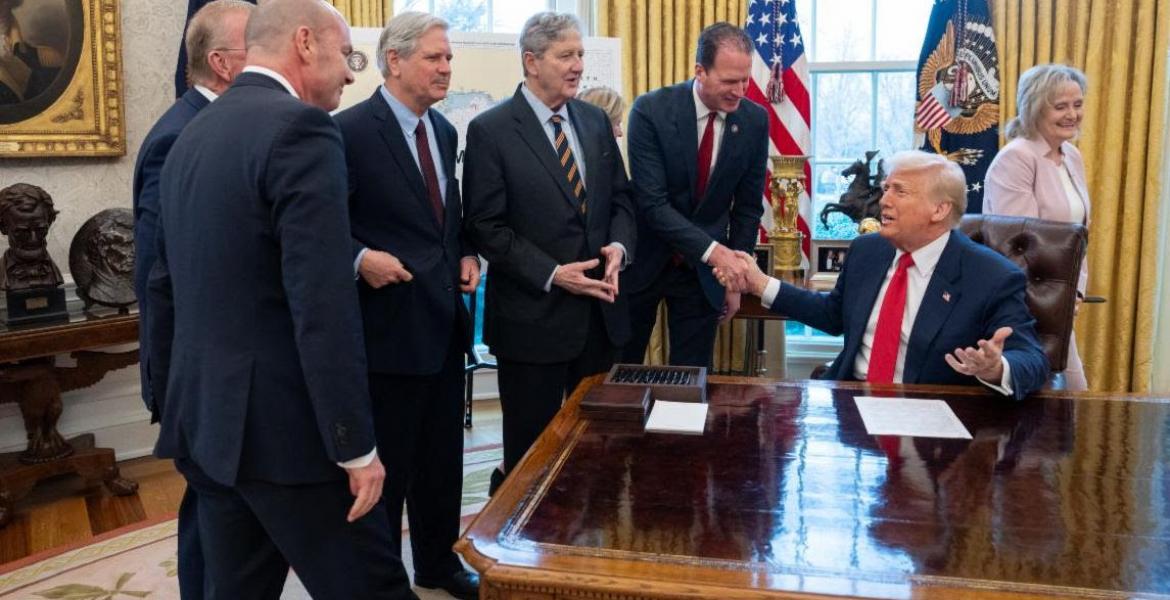WASHINGTON, D.C. – Mark Twain’s words hold true today: history may not repeat itself, but it often rhymes. Nearly 50 years to the day after the Yom Kippur War and subsequent oil embargo shook the global economy, the world watched in horror as the terrorist organization Hamas, backed by Iran, launched a brutal invasion of Israel — resulting in the murder of over 1,400 people and the abduction of hundreds more, including American citizens.
Iran, the world’s largest state sponsor of terror globally, uses fanaticism and extremism to stoke instability in the Middle East to expand their influence and threaten the existence of Israel, the United States’ strongest ally in the region. Unfortunately, failed appeasement strategies allowed Iran to conduct their terror mission throughout the region successfully.
Israel has an unequivocal right to defend its sovereignty in the wake of this barbaric invasion. This is Israel’s equivalent of the 9/11 tragedy, a watershed moment demanding a resolute response. Deterrence is pivotal in ensuring Israel’s success and preventing further escalation.
I applaud President Biden’s decision to travel to the Middle East and meet with leaders. His presence in Israel is the exact symbol we needed to send to the region: it shows the U.S. is united in our unwavering support for Israel and is a deterrent to Iranian aggression. But what must change is this administration’s larger policy towards Iran. The United States must be tougher in rhetoric and policy towards Iran and not negotiate with terrorists. History shows that appeasing rogue actors is a futile endeavor and will only invite aggression.
Maximum pressure campaigns, spearheaded under Presidents Trump and Obama, imposed sanctions on Iran for its malign activities and strengthened statutory sanctions on Iran’s central bank and oil exports, preventing the export of millions of barrels of oil per day. As a result, Iran was forced to slash its military budget and support for terrorism, reducing Tehran’s oil exports by over 75 percent and foreign currency reserves by 95 percent. Unfortunately, this administration has dwindled our leverage with Iran by relaxing sanctions in an effort to push Iran to accept a weak nuclear deal and reduce production of enriched uranium.
It is not coincidence that maximum pressure campaigns were utilized by two, very different presidents: this tool for deterrence is successful. President Biden must reverse course on the U.S. policy towards Iran. There is no other option.
Drawing a parallel with the events surrounding the Yom Kippur War, there is a crucial distinction today: America no longer grapples with energy scarcity; we are now energy dominant. In 2008, a remarkable engineering achievement empowered American producers to help end a global recession. The advent of hydraulic fracturing and horizontal drilling allowed the U.S. to significantly increase its production of oil and gas—resulting in the shale revolution. This fundamentally altered the dynamic with OPEC, establishing U.S. energy security as an invaluable tool for U.S. national security.
The transformative effects of the shale revolution are irrefutable. In just a decade, production in the Permian Basin, for example, surged from under 1 million barrels per day to over 5.4 million barrels per day, fueling Americans and fortifying our allies abroad.
Under the previous administration, we maximized every available tool to stabilize hostile regions — encompassing diplomacy, information, military might, and economic strategies. Energy is key in amplifying the effectiveness of each of these tools, as energy security is a critical component enabling freedom of action.
In the wake of the Yom Kippur War and at a time of profound domestic energy scarcity, the U.S. established the Strategic Petroleum Reserve (SPR). This stockpile was designed to store hundreds of millions of barrels of crude oil to counteract supply disruptions and, until now, was used primarily during natural disasters and geopolitical disruptions.
Today, due to President Biden’s political drawdowns to lower prices and stave off a recession, the SPR contains less than half of the crude it had at its peak. With an inventory of about 350 million barrels, it currently languishes at its lowest point since 1983. The shield against the weaponization of energy created in the wake of the 1970s oil crisis no longer exists—we are literally at the bottom of the SPR’s barrel. This is completely unacceptable, especially amid historic instability in the Middle East, and the president must immediately refill the SPR and restore this vital stockpile of energy.
After years of sustained high energy prices and a deadly withdrawal of forces in Kabul, President Biden is in desperate need of wins on both energy and foreign policy. It is critical that he reinvigorate the maximum pressure campaign and maintain our energy independence to ensure the United States remains the greatest power in the free world and aids our allies against authoritarian regimes.
August Pfluger, a former Air Force F-22 fighter pilot who flew nearly 300 combat hours in the Middle East, represents the 11th District of Texas in the U.S. House of Representatives. In Congress, he chairs the Homeland Security Counterterrorism, Law Enforcement, and Intelligence Subcommittee and the Republican Study Committee House Energy Action Team (HEAT).
Subscribe to the LIVE! Daily
Required






Post a comment to this article here: